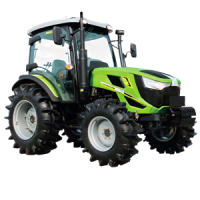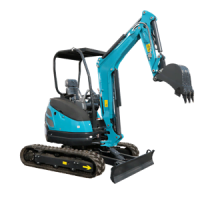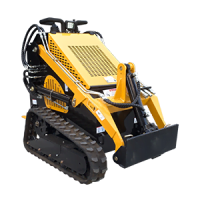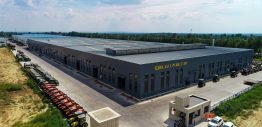Table of Contents
- Introduction
- The Intersection of Tractors and Sustainable Farming
- Enhanced Precision: Advancing Sustainable Practices
- Precision Agriculture and GPS Guidance
- Reduced Resource Waste
- Efficient Tillage and Planting: Minimizing Environmental Impact
- Conservation Tillage Techniques
- No-Till Farming and Soil Health
- Cover Crops and Crop Rotation: Nurturing Soil Fertility
- Cover Crops for Erosion Control
- Crop Rotation and Pest Management
- Optimized Irrigation: Water Conservation Strategies
- Drip Irrigation and Water-Efficient Systems
- Soil Moisture Monitoring
- Integrated Pest Management: Balancing Ecology and Yield
- Biological Controls and Natural Predators
- Reduced Chemical Inputs
- Organic Farming and Tractor Use: Cultivating Sustainable Systems
- Organic Certification and Regulations
- Mechanization in Organic Practices
- Renewable Energy Integration: Tractors Going Green
- Biofuel and Electric Tractors
- Reduced Carbon Footprint
- Economic Sustainability: Long-Term Benefits
- Cost Savings and Return on Investment
- Resilience in Variable Market Conditions
- Educational Outreach and Innovation: Shaping the Future
- Farmers as Stewards of Sustainability
- Continued Research and Innovation
- Challenges and Future Prospects: A Path Forward
- Technological Gaps and Accessibility
- Collaborative Solutions for Global Impact
- Frequently Asked Questions (FAQ)
- Q1: Can tractors be used effectively in organic farming without compromising sustainability?
- Q2: How do sustainable tractor practices differ across different types of crops?
- Q3: Are there financial incentives for farmers to adopt sustainable tractor practices?
- Q4: How can small-scale farmers with limited resources benefit from sustainable tractor practices?
- Q5: What role does government policy play in promoting sustainable tractor use in agriculture?
Introduction
Tractors, once emblematic of agricultural prowess, are now emblematic of a larger mission—sustainable farming. In an era where environmental stewardship and efficient resource utilization are paramount, tractors have emerged as catalysts for change. This comprehensive exploration delves into the pivotal role tractors play in shaping the landscape of sustainable farming, elucidating how their integration transforms conventional practices into environmentally conscious, economically viable, and socially responsible endeavors.
The Intersection of Tractors and Sustainable Farming
 As global concerns over climate change and resource depletion intensify, the agricultural sector is embracing a paradigm shift towards sustainability. Tractors, often seen as symbols of modernization, are adapting to this shift by becoming enablers of sustainable farming practices.
As global concerns over climate change and resource depletion intensify, the agricultural sector is embracing a paradigm shift towards sustainability. Tractors, often seen as symbols of modernization, are adapting to this shift by becoming enablers of sustainable farming practices.
Enhanced Precision: Advancing Sustainable Practices
Precision Agriculture and GPS Guidance
Tractors equipped with GPS guidance systems enable precise and targeted operations, minimizing overlap and optimizing resource allocation.
Reduced Resource Waste
Precise tractor operations reduce resource waste, including fuel, fertilizers, and pesticides, enhancing efficiency and minimizing environmental impact.
Efficient Tillage and Planting: Minimizing Environmental Impact
Conservation Tillage Techniques
Tractors facilitate conservation tillage methods that disturb the soil less, reducing erosion, preserving soil structure, and improving water retention.
No-Till Farming and Soil Health
No-till farming, made possible by tractors, protects soil structure, enhances soil fertility, and sequesters carbon, contributing to sustainable land management.
Cover Crops and Crop Rotation: Nurturing Soil Fertility
Cover Crops for Erosion Control
Tractors aid in cover crop planting, which prevents soil erosion, enhances nutrient retention, and improves soil health during fallow periods.
Crop Rotation and Pest Management
Tractors enable efficient crop rotation by facilitating planting and management, disrupting pest cycles, and reducing the need for chemical interventions.
Optimized Irrigation: Water Conservation Strategies
Drip Irrigation and Water-Efficient Systems
Tractors equipped with drip irrigation systems deliver water directly to plants’ roots, minimizing water wastage and improving irrigation efficiency.
Soil Moisture Monitoring
Tractors integrate soil moisture monitoring systems, ensuring that irrigation is applied only when necessary, conserving water resources.
Integrated Pest Management: Balancing Ecology and Yield
Biological Controls and Natural Predators
Tractors support integrated pest management by enabling the release of natural predators, reducing reliance on chemical pesticides.
Reduced Chemical Inputs
Integrated pest management practices, facilitated by tractors, lead to reduced chemical inputs, minimizing environmental contamination.
Organic Farming and Tractor Use: Cultivating Sustainable Systems

Organic Certification and Regulations
Tractors are integral to certified organic farming practices, supporting soil health, natural pest control, and sustainable cultivation methods.
Mechanization in Organic Practices
Organic tractors foster mechanization while adhering to organic standards, enhancing efficiency and productivity in sustainable farming.
Renewable Energy Integration: Tractors Going Green
Biofuel and Electric Tractors
Tractors are transitioning to biofuels and electric power, reducing greenhouse gas emissions and diminishing reliance on fossil fuels.
Reduced Carbon Footprint
The shift to renewable energy sources and advanced engine technologies reduces tractors’ carbon footprint, contributing to sustainable farming practices.
Economic Sustainability: Long-Term Benefits
Cost Savings and Return on Investment
Sustainable tractor practices lead to long-term cost savings through reduced resource usage, increased efficiency, and improved soil health.
Resilience in Variable Market Conditions
Sustainable tractor practices make farms more resilient to market fluctuations, ensuring economic viability in the face of uncertainty.
Educational Outreach and Innovation: Shaping the Future
Farmers as Stewards of Sustainability
Farmers play a crucial role as stewards of sustainability, spreading awareness and promoting the adoption of sustainable tractor practices.
Continued Research and Innovation
Ongoing research and innovation drive the evolution of sustainable tractor technologies, addressing challenges and maximizing impact.





-1.png)